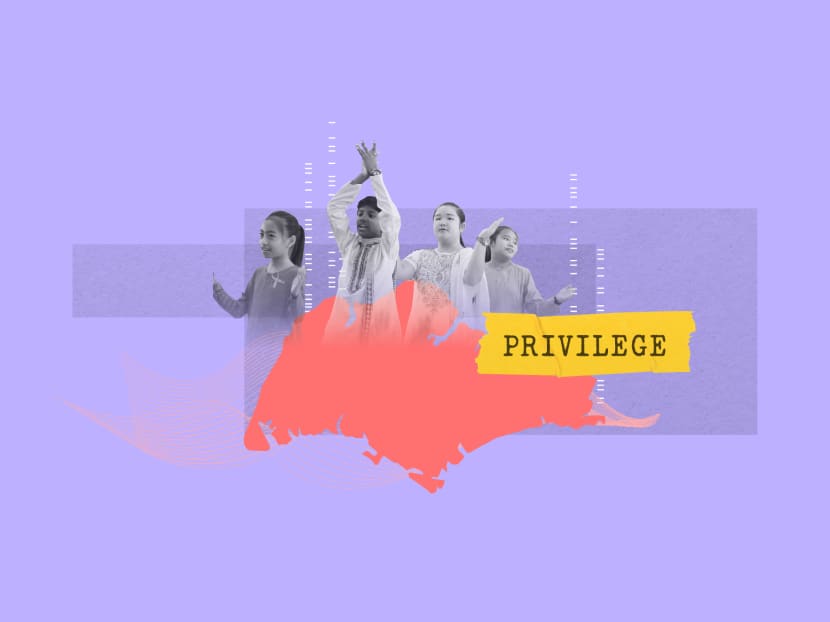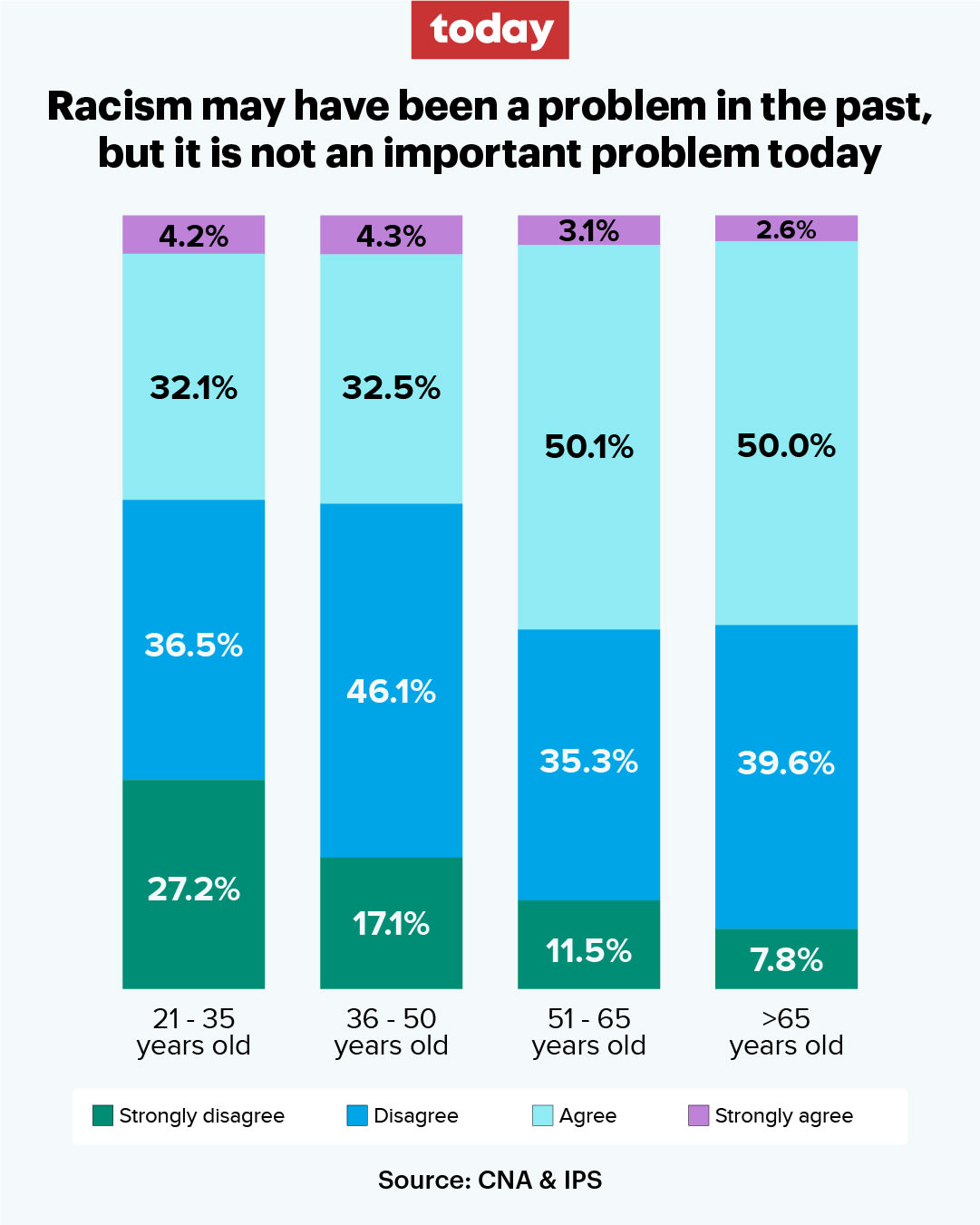Younger people more likely to see racism as important problem, feel existence of majority privilege: CNA-IPS survey
SINGAPORE — Young people are more likely to see racism as an important problem today than their older counterparts, a survey has found. The young, especially ethnic minorities, are also more likely to feel that being of the majority race is an advantage.

- A survey conducted by CNA and IPS formed the basis of a two-part documentary that was aired on CNA on March 31 and April 1
- It re-examined issues related to race and religion that were initially studied in the last edition of the survey published in 2016
- The survey found that young people here are more likely to feel that racism is an important problem today, compared to their older counterparts
- Young people in Singapore, especially ethnic minorities, are also more likely to feel that there is majority privilege here
SINGAPORE — Young people are more likely to see racism as an important problem today than their older counterparts, a survey has found. The young, especially ethnic minorities, are also more likely to feel that being of the majority race is an advantage.
The CNA-IPS Survey on Race Relations was conducted by Mediacorp news channel CNA and the Institute of Policy Studies, and formed the basis of a two-part documentary that was aired on CNA on Thursday (March 31) and Friday.
It re-examined issues related to race and religion that were initially studied in the previous edition of the study published in 2016.
Data was collected from 2,007 Singapore residents from November 2021 to January 2022, and the sample was quite similar to the national resident population in terms of age, gender and citizenship status.
The latest study found that young people in Singapore are more likely to feel that racism is an important problem, with 63.7 per cent of respondents aged 21 to 35 and 63.2 per cent aged 36 to 50 feeling this way.
But only 46.8 per cent of respondents aged between 51 and 65 and 47.4 per cent for those above 65 years old shared the same sentiments.
In a paper based on the survey findings, IPS researchers said this difference may be due to younger respondents having greater exposure to commentary about race issues on social media, where “woke” and “cancel culture” encourage minorities to call out examples of casual racism, the IPS report said.
On the other hand, older respondents tend to have lower levels of engagement with online media and some may have personally lived through the years of racial riots before Singapore's independence.
“With this context, the cases of everyday racism and other race-related incidents that are highlighted in news media may seem like less of an important problem as, while hurtful to those involved, they do not necessarily threaten the social fabric at large,” the IPS researchers said.
It also noted a marked increase in the proportion of respondents aged 21 to 35 who feel that racism is an important problem over the past few years — from 49.5 per cent in 2016 to 63.7 per cent now.
However, the figures for those aged between 51 and 65 and those above 65 years old “held steady in the last five years”.

MAJORITY PRIVILEGE IN SINGAPORE
The IPS researchers noted that the issue of racism in connection to privilege of a particular racial group "has gained salience in recent years — both in mainstream media and academia" here.
It brought up the example of "white privilege", which refers to "an invisible package of unearned assets that a white person has over people of colour".
It was a concept that featured heavily in racial discourse following the death of George Floyd, an African-American man who was killed by a police officer in the United States, in 2020. Nevertheless, the concept is not new in ethnic studies, the IPS researchers added.
In 1989, American anti-racism activist and scholar Peggy McIntosh published an article explaining the idea of “white privilege” by likening it to the claim that men are granted undeserved advantages over women, the IPS report noted. In the article, white privilege refers to “an invisible package of unearned assets” that a white person has over people of colour.
In Singapore, Dr Humairah Zainal, a research fellow at Lee Kong Chian School of Medicine in Singapore, and Dr Walid Jumblatt Abdullah, an assistant professor at Nanyang Technological University, published a paper in 2019 saying that Chinese privilege exists in Singapore and is perpetuated by the political hegemony of the ruling People’s Action Party.
But this was challenged by a paper published in 2020 by Dr Daniel Goh, an associate professor at the National University of Singapore, and Dr Terence Chong, Deputy Director of the ISEAS – Yusof Ishak Institute. They further argued that the concept of Chinese privilege is not a useful one for understanding politics in Singapore, the IPS researchers said.
The researchers noted that the "heightened interest and debate in majority privilege" was addressed by Prime Minister Lee Hsien Loong at the 2021 National Day Rally. In his speech, Mr Lee said that it is “entirely baseless” to claim that Chinese privilege exists here.
The CNA-IPS survey found that younger respondents were more likely to feel that majority privilege exists, with 63 per cent of those aged 21 to 35 feeling this way, compared with 45.8 per cent of those above 65 years old.
Young Malays and Indians were more likely than young Chinese to feel that majority privilege exists. Most Malays and Indians aged 21 to 35 (77.4 per cent and 81.8 per cent respectively) agreed that being of the majority race is an advantage in Singapore society.
In comparison, 58.1 per cent of Chinese respondents in the same age bracket felt the same way.
Most young Malays and Indians felt that racial minorities do not have the same resources and opportunities as the majority race, with 69.4 per cent of Malays and 63.5 per cent of Indians aged 21 to 35 feeling this way.
They also felt that the majority race has more resources and opportunities than other races, with 73.4 per cent of Malays and 69.9 per cent of Indians aged 21 to 35 feeling this way.
While older Malays and Indians were less likely than their younger counterparts to believe that majority privilege exists, the proportions were still higher than the corresponding age cohorts of Chinese respondents.
A total of 61.8 per cent of Malays aged 51 to 65 felt this way, compared with 49 per cent of Chinese in this age cohort.











